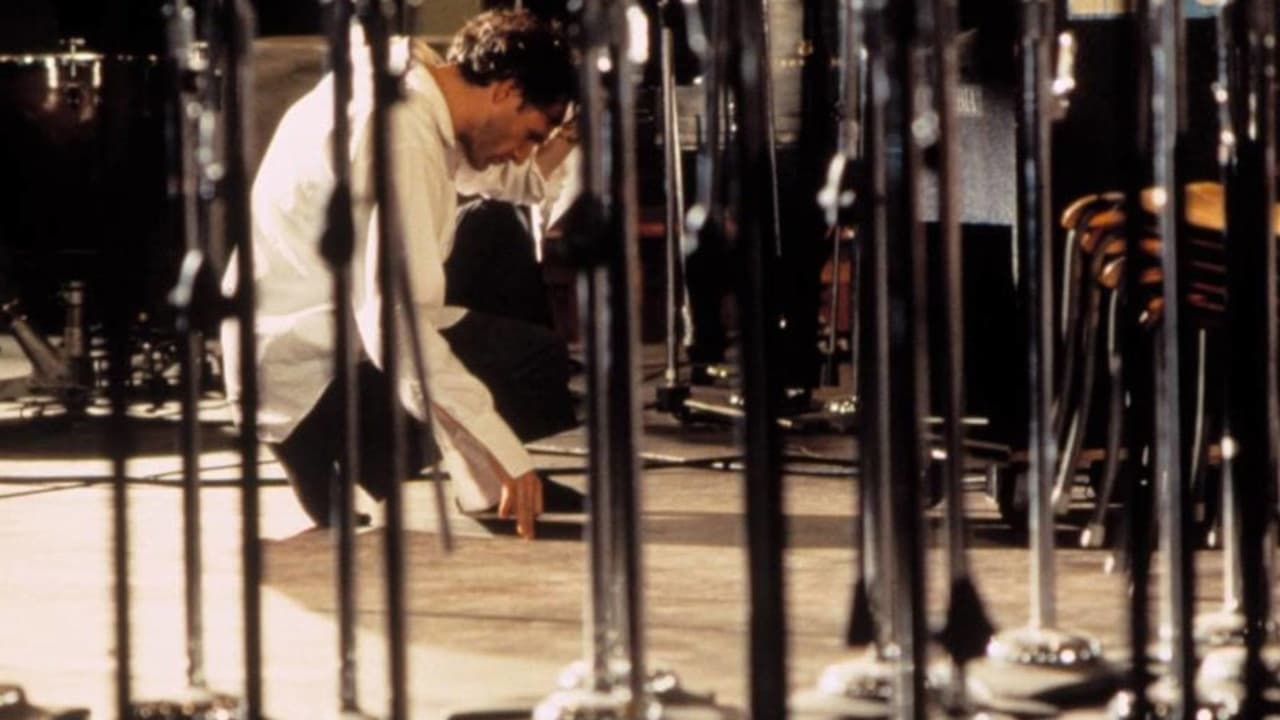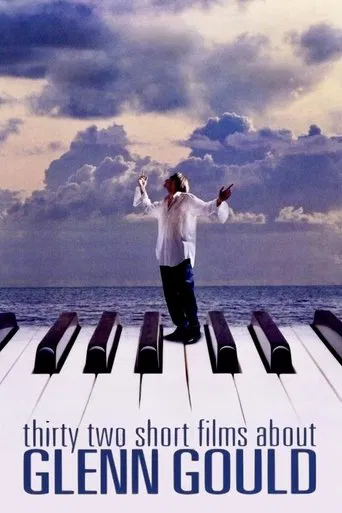

Let me preface this review by saying: the music of Bach permeates my existence. Over the years, I've listened to nearly every recording there is, repeatedly. That said, I had trouble watching this movie. The first time I tried, I quit after five minutes. Last evening, I made it all the way through. While at times moving, the film disturbs.For one, it does not do visual justice to the music. Bach's compositions are not about waving hands in the air, geometry animations, or men walking off into infinity. They're complex literary statements. This variety of music is akin to the best silent cinema; it says volumes, but without words. Like pantomime, it tells a nuanced story, weaving multiple plot lines together into an evocative fabric. Few of the 32 vignettes approached that ideal. Could it be that some of Bach's greatest admirers fail to grasp the deeper meaning within the music? In addition, Gould's personal faults grate on the nerves. It's clear he wasn't an ideal specimen. He mistook music for life. Music is a condiment, a catalyst perhaps. It frames life, drawing attention to worthy matters. It spices and enlivens life, making it savory. But it is not life. His mind was filled with picture frames, but no pictures. He fell in love with music in the same way that parrots sometimes mistakenly bond with their human owners. They are not parrots, and music is not a woman. One wonders how Bach might greet Gould in heaven: "So, the bachelor thinks he understands the man with two wives and twenty children? Let's see what kind of music you'll play after we give you a well-rounded life."
... View MoreThis is a great film, and it goes into territories that few films even recognize, let alone approach. It does start a little slow, and the first few 'shorts' can come off as a bit ... well, pretentious, to be blunt. But past that, it's a fantastic portrait of an interesting character, and one which satisfies on a number of levels --- creatively, intellectually, and even emotionally.What sets this film aside from many others are two main elements; the first is the novelty by which the film is presented: 32 short films, some of which are quite the same, but many of which are unexpected blasts of what can only be called 'experimental film'--- some of which seems almost silly, given how far technology and special effects have come since 1993. The 'films' really are quite short, and many of them are almost like small 'puzzles' which unfold so quickly that it's not until a second viewing that their underlying message becomes a bit more obvious, and it becomes clear how well-tied together all the shorts are. This is not short-attention span theatre, but it moves quick enough that once you get into the film, it's difficult to stop watching.The other element which makes this film so great is the basic premise, and the way in which it refuses to be dumbed down for the audience. This is the rare case of a movie that respects it's audience, even at the expense of losing half an audience by not being bombastic and overly obvious. The first few shorts are the weakest, but they establish the basic character and 'backstory' of Gould quite well" He's a piano virtuoso who has become so amazing at playing piano that calling him 'genius' is a bit of an understatement. And while his character has a definite surplus of eccentricities and quirks, this film doesn't focus on his genius as we're used to seeing films treat the subject. Whereas most films make out a person;s genius to be a heavy burden to carry, which always seems to come at a high cost and lead to a desire for normalacy (to make we in the audience feel better for not being geniuses, I suppose), 32 Short Films goes in another direction: Here's a genius who enjoys being who he is, who makes the most of his mostly self-imposed loneliness by turning it into art, who enjoys the intellectual challenge of his own conflicts with intellectual society. Rather than the familiar portrait of genius as a soul-crippling condition which becomes almost indistinguishable from minor autism, we see a full human being, realized and thoughtful, able to confuse the sometimes-adoring, sometimes-confrontational media by admitting that he doesn't think it's worth talking about music--- how about talking about Indian rights, or the supernatural, or something that has no ostensible connection to music or anything piano-related? If you play music, or if you are an aficionado of classical music, there's a whole depth to this film which you'll enjoy, although it's not as at the forefront of the film as you might suspect. This is not a film about music, but the sort of person who plays music, recognizable as a character APART from the skill which defines him so much for everyone else.This movie is a bit dated. That's really one thing it has working against it in some sense--- it feels at times like a movie from the 80's, and not in a 'cool 80's' way. Nonetheless, there's a certain air to the film which seems to disregard any particular age entirely, and this makes sense in a way, because Gould was clearly not one to feel confined to the age, and the ways in which things were being done.There are so many things that are tempting to say about this film, which are probably just my own interpretations and conclusions, which it's probably better not to go into, simply because half the enjoyment of this film is developing those realizations yourself. Even if you can't stand classical music, you'll find this film rewarding.Highly recommended.
... View MoreI for one loved the film. At first, I thought that the non-linear bit would wind up just being a gimmick, but I am happy to say my assumption was quite incorrect. If one is willing to put some effort into the film, rather than simply viewing it and really think about each film and its connection to the next short, there is some great content. My personal favorite was "Hamburg." It's all about the closing line in that one. If you haven't seen it, stop and think about this one in particular if you do. When you understand it, you'll get a great feel of how the film works. At times, though, it did get a bit tedious. Some shorts were not as interesting to watch--interesting to think about, though. All in all, I recommend it to anyone who has a little bit of time to think about it afterward, because that's where the satisfaction comes from.
... View MoreSpoilers hereinThe other half claim that the world is divided into two types of people. Depending on your vocabulary these are neurotics and psychotics; heads and hearts; numeralists and geometers; fatalists and cocreators and so on. Whatever terms you like to use, Gould is in the first of these, and that reflects his approach to music. Bach is also.Bach's music is highly mathematical, almost mechanically so. Stripped of emotion, it is pure in an abstract, cosmic sense. Gould's approach to music (and life -- not an incidental overlap) is neurotic, highly charged, anticipative, brilliantly logical, nimble. This mix -- together with a relatively more common virtuosity with the instrument -- makes Gould the best performer of Bach we have. His animation of the mathematics is always ahead of our own perception, so it makes the mathematics seem more alive. Not real life, but the kind of life we see in animated spheres.Contrast this with another world entirely, say Rubenstein (or Argerich!) and Chopin. This music is human, rooted not in some abstract aether, but in the soul. It is not clever, but real. It is not golden, but tearful, sweaty. It deals not with celestial mechanics, but with yearnings. Not with precision but with hesitations and local attractions. Not with planetary gravity but the emotional kind.Myself, I consider the latter to be true music, the life-altering kind. The former is brilliant decoration, also perhaps interesting technically. And that's the problem with this film: it emulates the Bach notion of little snapshot explorations. Each one is crafted to be technically brilliant; each one has some conceptual relationship with its neighbors. The sum triangulate the matter, giving a totality of external but abstract and distant probes.But the method lacks soul, and the subject here does too. We are intrigued by his eccentricities, but never invest in his being, because he doesn't have one in the musical sense. He has washed it away.For myself, I have to relegate this film to the huge stack of failed attempts to give us a film about music that has the same power, and type of power, as that music. It may be too hard an endeavor, but in this case the enterprise fails because the subject is in the wrong half of humanity.
... View More